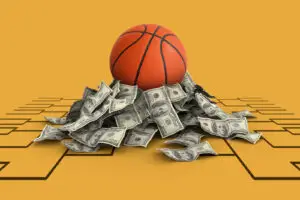March Madness is here and with it thousands of people will try to beat the odds by picking the perfect bracket. What are the odds of a perfect bracket? There are 263, or 9,223,372,036,854,775,808 possible outcomes in the NCAA tournament. That would mean there’s a 1 in 9.2 quintillion chance of picking a perfect bracket if every game was decided by a coin toss. Sounds impossible doesn’t it? Well, that’s because statistically it is almost impossible.
That’s also why Warren Buffet is so comfortable offering a prize of $1 million-dollars per year for life to any of his employees who can pick a perfect Sweet Sixteen bracket. Let’s use Buffet’s net worth as a comparison to the chances of picking a perfect bracket. His net worth stands around $84.9 billion dollars which would need to be multiplied 108,638,068.75 times to reach 9.2 quintillion. The odds of a perfect Sweet Sixteen bracket are slightly better, with a 1 in 281,474,976,710,656 chance. Don’t expect anyone to claim that prize any time soon.
But how does March Madness compare to the stock market? Well, in a way the NCAA tournament is much more predictable. Every March Madness season 63 of 64 teams are guaranteed to lose at least one game. 32 teams will lose their first game, 16 their second game, 8 their third game, 4 their fourth game, 2 their fifth game, and 1 their sixth game. That’s a lot more predictable than the stock market, when every day brings the possibility of either gain or loss for every investment holding.
Fortunately a lack of predictability does not mean that your chance of success is lower in the stock market. Quite the contrary. Lucky for us, the stock market doesn’t have to have winners and losers. More than one “team” can win. In fact, over a long period of time, almost everyone “wins”. Let’s take the worst financial crisis in recent history as an example. The Great Recession between 2007-2009 saw the S&P 500 lose roughly 50% of its value. Not great, right? Well, the S&P 500 has seen gains of over 300% from the bottoming out of the market March 9th, 2009 and gains of over 80% from the peak of the market in October 2007 before the crash. Furthermore, historically the stock market has had more up days than down days.


